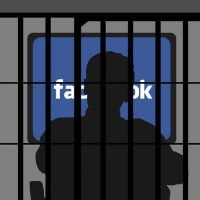“The internet is the only place left where people can live in freedom. Not bothered by any limitations: no body scans, pre-emptive searching or security cameras (with or without audio). There’s none of that pre-emptive DNA fingerprinting chip-in-your-thumb personalised-chip-cards-for-everything road-pricing-by-the-kilometre I-don’t-have-anything-to-hide business we used to have around the beginning of this century. Information exchange on the internet is very secure: just like offline privacy of correspondence with paper mail, since 2057 we’ve had the right to TCP/IP privacy, and public prosecutors need authorisation from a supervisory judge before they can take a website down. Mandatory data retention for ISPs and their large databases of privacy-limiting information have been legally abolished, and wiretapping is only permitted with authorisation from the aforementioned supervisory judge. Recently the government has been saving money by using computers and digital networks. Oh, if only.”
When I was nine – or was it ten? – and I first came into contact with the internet, I could not have guessed that something that only existed on my computer screen (after listening to a horrid series of beeps) would later influence my life to this extent. Influence it and control it. I’m 23 years old now, I’m the founder of a hosting provider and everywhere I look, I see the web. The web of information we’ve build around ourselves, that network that was once only accessible to people with a telephone and a modem. Now, in 2010, we use the internet to make phone calls. That’s how much has changed.
When I was 20 and I decided on top of my busy job to take up studying jurisprudence at the University of Amsterdam, I didn’t realise the internet would end up being so important to my subject. I thought it would be a good idea to go to college, to go do one thing in my life that WASN’T all about the internet. A painful, but interesting mistake. More and more legal issues somehow involve the internet these days. E-mails as evidence, Twitter as a platform for statements that may or may not be insulting or threatening. Using an internet connection like an underground tunnel to break into a bank vault. An online hotel where fellow guests are robbed of their digital possessions. The DSB bank going belly-up, customers who can’t get to their money as a result of an unavailable website. On top of that, courts see the introduction of more and more possibilities for digital litigation. Law firms can’t escape it either. And that’s only the beginning.
By this time I was spending half of every week on consultancy for other companies. The internet, social media and online marketing absolutely, positively had to be introduced everywhere, supposedly. The introduction of iPhones and Blackberries and flat fee subscriptions encouraged the rise of mobile internet usage. By now those devices and their usage have become so popular that millions of euros and dollars of revenue are made every month in apps and sales in webshops, used with ever shinier and ever more expensive new devices, with overburdened mobile phone networks as a result. It’s time to convert the flat fee subscriptions into subscriptions that also safeguard the future and the growth of a stable mobile network.
Not many people know of the historical origin of the internet. It certainly seems quite something, one cable showing up in everyone’s meter cupboard, connecting you to your neighbours and to the rest of the internet. Nation-wide, even pan-European coverage for your mobile phone. A lot of people – I was surprised to find out – even think we owe the internet to the efforts of the government, because, well, look at the newspapers, just about every week you can read about some minister or member of parliament saying something that has the word ‘internet’ in it. And to think it’s all thanks to universities and the business world that we can now hear the news an average of 12 hours earlier than if we would still depend on offline newspapers.
The introduction of social websites like Facebook, Hyves, Twitter, Flickr, Youtube and major weblogs and fora has shown that the internet can be used for much more than just private communication by email or via a Skype call. There are millions of tweets, weblog posts, online profiles and audio and video for everyone to see. And that’s where it goes wrong, because the government too can see how the importance and the influence of the public internet are growing day by day. And there is much danger, and much crime. Out there, on the streets. What to do?
With new laws and regulations, more and more data about internet users are being gathered and stored in large databases. The music and film industry, led by the anti-piracy organisation Stichting BREIN, are trying to curtail the freedom of Dutch internet users by arguing for an active filtering system, which imposes limitations on all internet connections. Because maybe you’ll possibly one day do something that large, privately owned, for-profit record companies (do you still have a record player?) think might be bad. While downloading for home use is in fact perfectly lawful in the Netherlands, and is well regulated through the private copying levy, which may be due for some renovation. But it’s all for the artists, say the record companies, whose profits number in the millions of euros.
Thank goodness we have Bits of Freedom, an organisation standing up for your freedom and privacy on the internet. And thank goodness we have internet service providers like XS4ALL, who don’t shy away from hiring the best lawyers and taking the legal battle all the way to the Supreme Court, to fight for that last bit of freedom on the internet.
Danny Mekić is an online entrepreneur, a jurist and a consultant specialised in the commercial, legal and technological (im)possibilities of the internet. He wrote this article on request of Dutch internet provider XS4ALL.

Leave a Reply